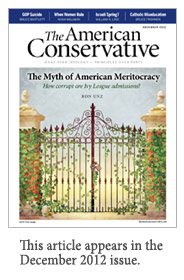Arab Spring, Israeli Winter

Since the late 1980s, I have argued that the fundamental question in war and foreign affairs has changed. It is no longer which state will triumph over which other state. The new question is whether, in the face of the rise of powerful non-state entities, the state system itself will survive.
The two most important books on that question were both written by Israeli military historian Martin van Creveld. The first is The Transformation of War, the second is The Rise and Decline of the State. Though published later, Rise and Decline offers the historical evidence behind the thesis in Transformation and is best read first.
Over the years Martin and I have become friends. I recently interviewed him on the subject of the misnamed “Arab Spring” and its potential outcomes for Israel. America’s neoconservatives have cheered events in the Arab world, thinking that the weakening or destruction of Arab states would benefit Israel. Van Creveld offers a useful corrective to that optimistic assessment.
The American Conservative: Does the Arab Spring point to summer or winter for Israel?
Martin van Creveld: For Israel so far, the “spring” has been a minor disaster. Let’s not waste time on countries such as Tunisia, Libya, and Yemen, which are far away and whose impact on the Arab-Israeli conflict is relatively minor. The revolution in Egypt has led to a sharp deterioration in the relations between that country and Israel. The fate of Syria hangs in the balance, but it is entirely possible that the fall of the Assad regime will result in anarchy and cause Syria to turn into a second Afghanistan, a base for anti-Israel terrorism. Jordan too is not necessarily immune.
TAC: What is really going on in the Arab Spring? Is it the rise of democracy and “freedom” as the West defines it? Or something very different?
MVC: The situation seems to vary from one country to another. In Tunisia, the so-called Yasmin revolution has led to the installation of a relatively moderate Islamic government. Whether or not that means democracy, will, however, only be put to the test if and when the time comes for another election which the opposition may win. In Libya, the outcome has been virtual disintegration of the central state which is unable to cope with the various regional militias. Yemen following the revolution has become even more anarchic and more of a stamping ground. In Egypt, the most important effect of the revolution so far has been the loss of control over the Sinai, which likewise is becoming, [or] has already become, a haven for terrorists and criminals. As I said earlier, the fate of Syria hangs in the balance.
It would seem that, in each country, four outcomes are possible. They are, first, the substitution of one military dictator for another; second, the rise of an Islamic dictatorship; third, anarchy; and fourth, democracy. Generally speaking, the last possibility is the least likely one. The reason for this is the persistence of tribalism, which makes democracy very difficult to achieve.
To use a historical analogy, ere Cleisthenes was able to establish the world’s first true democracy in ancient Athens he had to demolish the tribes into which the population was divided. In Rome, by contrast, the survival of the tribes led to the creation of an aristocratic republic. Only late in the second century B.C. did attempts at greater democratization get under way: the outcome, as we know, was military dictatorship.
TAC: American neocons reportedly played a major role in devising for Likud a strategy that called for the destruction of every Middle Eastern state that could threaten Israel—with no thought about what might replace those states. Are you aware of this strategy? What role has it played in events we are now witnessing? Does it remain Israel’s strategy today?
 MVC: I’d say that, as the invasion of Iraq showed, the neocons have grossly overestimated their own ability to influence events in the Arab world. Typical of them! As to Israel, as far as I know it was as much taken by surprise by those events as anybody else. There was no question here of any coherent strategy aimed at achieving anything.
MVC: I’d say that, as the invasion of Iraq showed, the neocons have grossly overestimated their own ability to influence events in the Arab world. Typical of them! As to Israel, as far as I know it was as much taken by surprise by those events as anybody else. There was no question here of any coherent strategy aimed at achieving anything.
TAC: What role did the Iraq invasion play in current events in the Middle East?
MVC: To be honest, I do not know that it played any role. Saddam, after all, was brought down not by his own people but by U.S. military power. By contrast, the various [Arab Spring] revolutions were indigenous, the product of long-standing pressures and grievances that differed from one country to the next.
TAC: How does this end?
MVC: Depending on the country, in one of the first three ways on the above list. One thing appears certain: namely, that no Arab country is going to become a nice, democratic, liberal, and apple-pie loving state anytime soon.
William S. Lind is director of the American Conservative Center for Public Transportation and the author of the Maneuver Warfare Handbook.
Comments